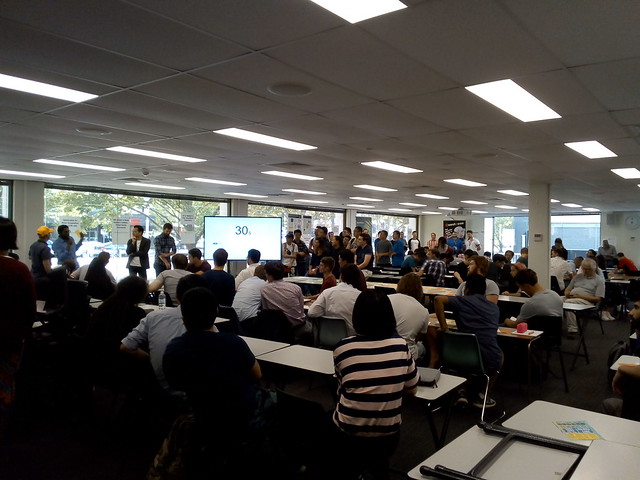 |
| ANU TechLauncher, Team Formation Exercise |
For these courses over 12 weeks, the student is expected to undertake 120 hours of study. The reflective report makes up 20% of the assessment for Techlauncher and 15% of the Internship. So this is a significant 18 to 20 hours work. But what is the student learning in this time?
Learning outcomes for Software Engineering Project COMP3500:
Learning Outcomes
Techlauncher is offered in five ANU project courses: COMP3500, COMP3550, COMP4500, COMP3820 and COMP8715. These have similar learning outcomes.
- Work as an effective member of a team to implement a software based solution that delivers measurable value to an industry or university client.
- Develop life-long learning through reflection, as demonstrated through continual reflection on the software development lifecycle and team work processes experienced throughout the year.
- Exhibit an awareness of
- team formation strategies and stages leading to the development of high performing, self-managing teams;
- sound meeting practice; and
- how personality traits can impact upon team performance and how to use individual traits to achieve the most from team work.
- Make and defend sound engineering decisions.
- Communicate effectively, orally and in writing, with peers, supervisors and commercial clients/stakeholders.
- Creatively identify and implement a solution to a complex problem that exists within the domain of ICT.
- Participate effectively in project and artefact reviews with peers, supervisors and clients/stakeholders.
- Explain the role and importance of project management, configuration and risk management processes when undertaking a software development project. Demonstrate experience in undertaking the activities associated with these.
- Explain and understand the importance of the different stages of, and activities associated with each, the software development lifecycle (SDLC). Demonstrate experience in all stages of the SDLC.
- Explain the role and importance of standards in software development. Demonstrate experience in tailoring those standards approriately according to the project they are currently undertaking.
- Participate in a group presentation, including a demonstration, to an audience of peers, clients and supervisors.
Learning outcomes for COMP8715:
- apply the student's knowledge and implementation skills in the computer science, and apply this to an advanced and specific project topic in that area.
- deepen their knowledge of computing principles and practice through undertaking the project.
- earn any specific technical skills required by their topic, and apply them to project work.
- apply and deepen skills in oral and written communication, and apply these in a project context.
- learn relevant project-related skills, including project management, teamwork, ethics in research, knowledge of relevant research, evaluation and production of project artifacts.
The learning outcomes for the Computer Science Internship COMP8830 are also similar:
The common elements of these, relevant to the reflective exercise, I suggest, are:
- Demonstrate a personal commitment to ethical behaviour, competent practice, meeting legal and regulatory requirements, taking responsibility for their own work and acknowledging the work of others.
- Demonstrate autonomy, adaptability, a commitment to safety and sustainability, appropriate engagement with relevant stakeholders, and an ability to identify, assess and manage risk.
- Communicate effectively and work productively in a multi-disciplinary team, using initiative and sound judgement, to achieve defined workplace objectives.
- Apply their knowledge and skills in computer science to explore and critically analyse a real-world problem; using creativity and innovation, identify and critically evaluate potential solutions to the problem; choose and implement a particular solution; and critically evaluate and analyse the outcomes and impact of this solution.
- Demonstrate an understanding of lifelong learning processes, and clarification of their personal and professional goals, through critical reflection on their internship experience.
- Learning: reflection, clarification of goals
- Communication: orally and in writing
- Management: Team work and Client focus
Addressing of the first of these, as MacKrell, Mhaisuria and McDonald (2013) pointed out, some of the skills interns learn, and report via their portfolio, are in the area of Skill management,. The authors specifically cite a skill definition from the Skills Framework for the Information Age:
"The provision of learning and development processes (including learning management systems) in order to develop the professional, business and/or technical skills required by the organisation."
From: "learning and development", Skills Framework for the Information Age, Version 7, 2017
Normally the detail of the skill definition would come from a level matching the degree program (usually Level 3 for Bachelors and Level 5 for Masters). However, in this case the student is learning to manage learning, which is a higher level skill, even though it is their own learning they are managing:
"Determines the learning and development programme and delivery mechanisms needed to grow staff skills in line with business needs. Identifies appropriate accreditation and qualification paths, applicable to individuals within the organisation. Evaluates learning outcomes. Manages the development and provision of all learning, taking account of the strategic aims of the employing organisation."
From: "learning and development", ETMG Level 6, Skills Framework for the Information Age, Version 7, 2017
This could be adapted for an individual learning objective:
Reference
"Determine the learning needed and possible sources, to grow individual skills for the project, and career plans. Identify appropriate accreditation and qualification paths. Manage the learning and evaluate outcomes."
Reference
MacKrell, D., Mhaisuria, M., &
McDonald, C. (2013). The skills framework for the information age as a means for investigating work-integrated learning. In 24th Australasian Conference on Information Systems Melbourne, Australia.
No comments:
Post a Comment